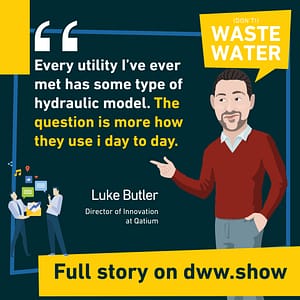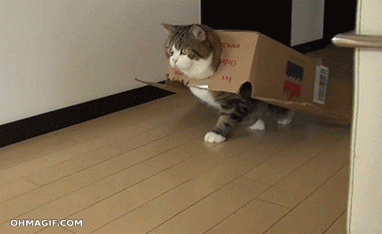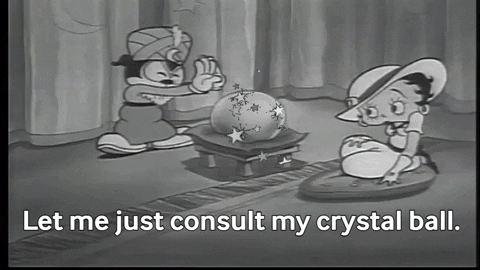Have you tried Digitizing your Water Utility, treatment plant, or network? Did you turn it into a Water 4.0, IoT-enabled asset, operated thanks to process modeling, AI, and machine learning?
So many buzzwords, right 😀
There’s a lot of value for the Water Industry in each of these terms, and a wealth of opportunities for you. But there’s also a lot of noise!
Shall we cut through the fog? Let’s start ⬇️
Table of contents
Water Digitization is Everywhere (and so what?)
You can hardly open a Water Industry brochure, listen to a talk or assist in a webinar without hearing about the perks and opportunities of digitization in the water sector.
But that being said, and once we’ve sorted the fear of missing out, what shall you really grasp about this digital water age? Well, I strived to review the digital water craze, and what it involves.
In a nutshell, I’d say that both the enthusiasts and the haters are probably too extreme. But there are simple steps you can take today, without disrupting your processes, that will pave the path towards a digital-enabled future!
New Frontiers in Water Digitization
Let’s now light this topic from a new angle: the new frontiers in Water Digitization, one of them being the way we acquire our data, and what may be coming soon:
I’m as an innovator personally excited for the day when we can connect to real-time sensors to bring that data in. Because the faster our customers in the market get those results, the easier that they can make real time decisions!
Megan Glover – CEO & Founder of 120 WATER
Now that may well be the future, but Luke Butler brings us a bit down on earth when it comes to the present:
Every utility that I’ve ever met has some type of hydraulic model. The question is more how they’re using it day-to-day. Do they use it every day? Is it core of their operation? Or something they pull out every five years to ask a couple of questions, then put on the shelf?
Luke Butler – Director of Innovation of QATIUM

Differences between the World in General and the Water Industry
Actually, there’s a certain disconnect between the level of technology generally available, and what’s at use in the Water Sector:
I got my first iPhone. And I couldn’t understand how there could be so much technology in this little device and then our infrastructure, which is the thing that protects us against these real environmental catastrophes is so reactive! Literally everything in the storm water and the drainage networks in Australia or every country in the world was the same at this time. It was reacting.
Brian Moloney – CEO & Founder of STORMHARVESTER
We could laugh at it, and be happy to be a low-tech industry!

The cyber-security risk
I’ve had that discussion in the past with specialists that find the risk/benefit balance actually pretty unbalanced on the side of the risks.
If you’ve followed the news, you’ve probably heard of the drinking water treatment plant in Texas, that got hacked so that the level of sodium hydroxide was multiplied by 100 in early 2021.
The incident was detected before the water exited the plant, so it’s more of a warning call than a disaster, yet some think this is just the one that got publicized and that hacks must be happening more often than that.
Yet, first, if you ask me, this is speculation. And if cyber security risks do exist, the missed opportunities are also not to be undervalued!
Opportunities in the Digitized Water World
I see hydraulic models having so much more potential than just being something that’s pulled out every five years to write up a big plan on where you want to build your infrastructure.
Luke Butler – Director of Innovation at QATIUM
Luke talks of hydraulic modeling, but I’d extend the potential to an entire set of tools, ranging from Machine Learning to Geographical Information Systems through AI.
I’ve prophetized that 2022 will see the first AI-operated wastewater treatment plant, and I stand my point. I’m nothing of a futurologist, but I firmly believe that technology is mature enough for our Sector to give it a chance – which would open quite a lot of new frontiers when it comes to distributed treatments.
Let’s get our Water Data straight!
Yet, all of that is pure conjecture, as long as we don’t solve a basic issue
Bad data in bad data out. Right? No data insights, no improved workflow.
Megan Glover – CEO & Founder of 120WATER
Data is the name of the game. And in most cases, it’s less about gathering it, than it is about making it available to its best point of use.
The data itself, isn’t locked into a single platform. The users can choose what they want to do with their own data. And if that’s to consume it in their own applications or work with others, we want to be able to support that.
Luke Butler – Director of Innovation at QATIUM
Now the system Luke Butler describes is honestly more of an exception today in our sector.
Is the Water Industry enough of an open ecosystem?
We’re building more silos than open data lakes, which can be surprising for a new-comer like Meena Sankaran:
It was so shocking to me being a newbie in water to see how black box and closed off these ecosystems are!
Meena Sankaran – CEO & Founder of KETOS
So if we want water digitization to stand a chance in the future, we need to open up, which in turn creates a whole new world of collaboration.
People in the industry really seem to enjoy this different approach where you are openly sharing what you’re doing. I think that the industry is at its best when everyone is sharing what they do.
Luke Butler
Sharing (even with your competitors) is good for you
Isn’t that counter-intuitive? How can it be positive for you to share your data with your industry neighbors and, who knows, competitors? I could be explaining, but Navkaran Singh Bagga does that much better:
The question that I was asked is, “Are you proprietary? Are you going to protect this?” And my idea was the more players we can invite to come into the space, the more we can get the movement going. So I would look at getting more people into the space and better tech. Water is a space, which is not limited, even from a market perspective. So they cannot ever be too many players!
Navkaran Singh Bagga – CEO & Founder of AQVO
In a future that’s a bit less black-boxed and a bit more open, digitization may become integral to the Water Industry. And without over-using the big words, that may sound like a disruption for today’s water professionals.
Will digitization disrupt water professionals?
I jokingly refer to myself as an engineering therapist because many engineers, when they come to grips with the fact that software can actually do quite a bit of what they’ve done for 10, 20, 30, 40 years of their career things, playing around in Excel spreadsheets or drafting P&IDs or creating BIM models of buildings… Software’s really good at doing that stuff. So I help them overcome sort of this existential crisis of what happens to my job. If software starts to automate a lot of that boring work that I’m doing.
Adam Tank – Director Software Solutions of TRANSCEND
Again, that’s a fear I can understand. If digitization develops, machines and algorithms will take over some human tasks. I could answer by quoting Imre Takacs on that microphone, who stated that “a model will never grease a pump.”
There will be new opportunities in a digitized water world
But beyond that, the World Economic Forum predicted that by 2025, technology would create at least 12 million more jobs than it will destroy.
Yet, this is a balance, not a pure creation. Jobs will be disrupted; more will be created, so to embrace digitization, we will all also have to embrace agility and accept that a 40-year pre-written trajectory no longer exists.
We will probably have to upskill, but according to economists’ projections, there’s a reward associated with this learning investment we have to commit: wages shall raise by an estimated 10 to 15%.
In conclusion, will digitization see a big boom in 2022? Will we see Water NFTs? Shall you become a blockchain expert?

Hey I warned you, I’m not a futurologist, I don’t have all the answers. But what I know for sure, is that we shall be more open to digitization as an industry. Don’t you think so?

